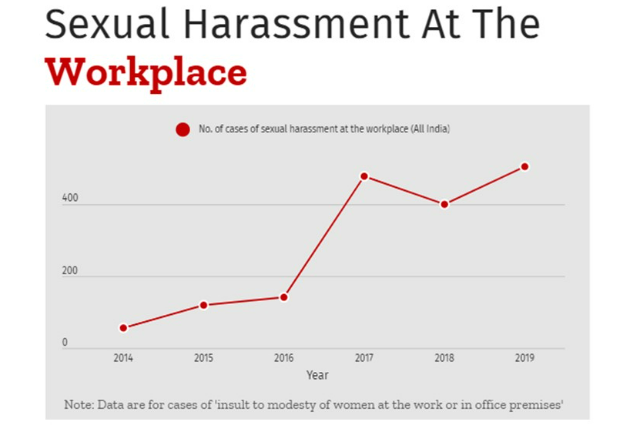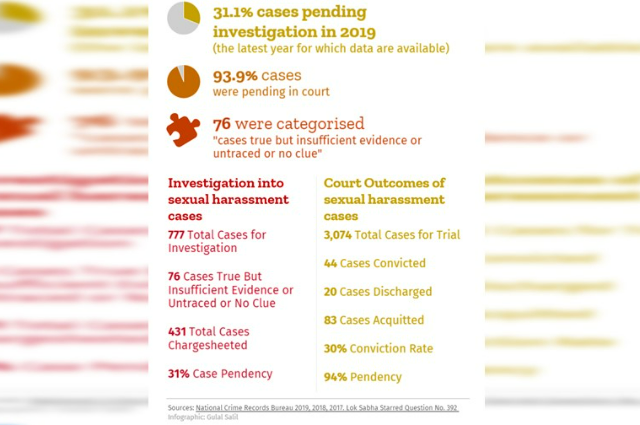
Photo by LYCS Architecture on Unsplash
Abstract: Workplace harassment is a pervasive issue that not only harms the victims but also damages the reputation and goodwill of organizations. Despite the growing awareness and development of society, harassment remains a problem, particularly for women who form a significant part of the workforce. Harassment takes various forms, including physical, verbal, sexual, emotional, psychological, financial, and mental mistreatment. Both males and females can be victims, but women are more commonly affected. All forms of harassment are illegal and constitute criminal offenses. This paper emphasizes the importance of maintaining a harassment-free work environment to promote business growth and safeguard employees' rights. To achieve this, organizations must enforce zero-tolerance policies against any form of harassment. Additionally, the government should actively address this issue, develop stringent laws, and establish internal complaint committees to ensure the safety and dignity of women in the workplace.
Workplace harassment not only inflicts harm upon the victim but also tarnishes the reputation and erodes the goodwill of the organization.
Harassment, a term firmly entrenched in all English dictionaries, has been a longstanding issue in human society, with harassers and those being harassed coexisting since the dawn of civilization. Despite its historical presence, workplace harassment remains an enduring challenge, especially for women. In the past, women endured various forms of harassment with little recourse, often forced to tolerate such maltreatment at the risk of their very lives.
As society has progressed, significant advancements have occurred in human thinking, and women's literacy rates have risen, empowering them to assume prominent roles as breadwinners and professionals. Women have become an integral part of the workforce, contributing their expertise and skills across various fields, spanning from agriculture to the military, from low-level positions to esteemed officer ranks, and from manual labor to engineering roles.
Nonetheless, workplace harassment continues to be most prevalent against women. Despite being revered in many cultures, women often face harassment in multifarious ways. Although transparent in their thoughts, laborious in their endeavors, and dedicated to their duties, women frequently encounter discouragement and ill-treatment from coworkers, superiors, and other employees within their professional environments.
It is essential to recognize that workplace harassment encompasses more than just sexual harassment; it manifests in several deleterious forms. Gender-based harassment stands out as an especially pernicious aspect of this issue, perpetuating an environment where individuals face hostility based on their identity. Moreover, singling out individuals for harassment poses severe threats to their well-being.
As illustrated by the graph, workplace harassment has been escalating at an astonishing and alarming rate. If not addressed promptly, this escalating trend could give rise to far more profound and pervasive issues than those we are already contending with.
The types of workplace harassment include physical, verbal, sexual, emotional, psychological, financial, and mental forms. These transgressions affect not only the targeted individuals but also the overall organizational climate. Perpetrating any form of workplace harassment constitutes a criminal offense, challenging the principles of natural justice and violating fundamental human rights.
Despite affecting both genders, workplace harassment disproportionately impacts women. Consequently, organizations where such harassment prevails risk not only losing public goodwill but also exposing themselves to legal liabilities for their failure to provide a safe and inclusive work environment.
According to the Equal Opportunity Commission, workplace harassment can manifest through offensive jokes, slurs, name-calling, physical assaults, threats, intimidation, ridicule, mockery, insults, offensive objects or pictures, and interference with work performance. Regrettably, many victims remain skeptical about reporting harassment due to fears of retaliation, perpetuating a toxic and abusive workplace environment. This, in turn, negatively impacts productivity, employee relations, and ultimately the reputation of the organization.
To ensure sustainable business growth and foster a harmonious work environment, organizations must rigorously maintain official decorum and institute a zero-tolerance policy towards harassment. Workplace harassment not only disrupts the victim's sense of safety but also impairs their ability to interact effectively with superiors and colleagues, impeding professional progress.
This problem goes by various names, such as mobbing, workplace bullying, workplace mistreatment, workplace aggression, workplace molestation, workplace abuse, and discrimination. Each of these terms underscores the complexity and severity of the issue at hand.
The United States Department of Labor defines workplace harassment as extending beyond sexual harassment to encompass quid pro quo harassment or the creation of a hostile or unfriendly environment. Consequently, some women voluntarily leave their jobs, while others are forcibly removed from their positions due to the prevalence of such behavior.
It is crucial to recognize that workplace harassment is not merely an inconvenience; it is a blatant violation of basic human rights, including the right to freedom of speech, the right to livelihood, and the right to live with dignity. In light of its significance, the government should adopt a vigilant stance and approach this matter with utmost seriousness. Specific legislation tailored to address workplace harassment needs to be instituted, ensuring comprehensive legal protection for victims and appropriate consequences for perpetrators.
Presently, there are no specific laws in the Indian Penal Code (IPC) or the Criminal Procedure Code (CPC) dedicated to workplace harassment. To demonstrate a commitment to the safety and well-being of women employees and clients, establishments should prominently display a board stipulating that any individual found harassing women will face immediate termination and relevant legal action.
In addition to Internal Complaint Committees and Local Compliance Committees, the government should enact stringent legislation to safeguard women's rights and create a conducive and secure work environment for all individuals, regardless of their gender. Such measures would reinforce the principles of equity and justice, establishing a foundation for a fair and thriving workforce.
A poem dedicated to this:
I, an example, live happily still,
Fighting for my women's right and will.
Due to union conspiracy, I am alone,
Against bribery, fraud, I firmly intone,
No support for illegal activities shown.
Mahila branch employees, all but me,
Ostracized without a call or resolution decree,
Where I am insulted, in pain I plea.
The resolution to AOCCBEF units sent,
To the General Secretary, my concerns I vent,
Silent he remains, my worries torment.
All units accepted, except me, the target,
Harassed and threatened, their intent to foment,
Mahilas forced to sign or transfer torment.
False allegations led to my transfer plight,
Despite health issues, in pregnancy's light,
With a child by my side, I faced the night.
Forced to join Sonepur Mahila Branch domain,
Four months earned leave, a respite to gain,
After maternity, I returned again.
Resided in Sonepur with my kids so dear,
Appealed for transfer, hope shimmering clear,
Mahila commission's help, my path's frontier.
Commission urged for a transfer near,
But authority ignored, detained me here,
Six years bound, in distress I adhere.
Letters written for Mahila Branch's grace,
Unheard by authority, they turned their face,
Union leader and Branch Manager, a hostile embrace,
Harassment's grip, a heart-wrenching chase.
In 2009, promotions were bestowed,
Except me, unjust favoritism showed,
Intolerable situation, my spirit slowed.
Seeking justice, Hon'ble high court I sought,
But the case lingered, justice unbought,
In the meantime, harassment's flame was fanned,
An illegal action taken, my spirit unmanned.
Four managers involved, including Sudhir Chand,
Subjudice case, but promotion not banned,
To the post of AGM, S.K. Chand's stand,
Illegally a secretary, peace unmanned.
Union leader S. K. Chand, once my peer,
Now a harasser, instilling deep fear,
Monetary injustice, my voice they smear,
In my personal file, falsehoods appear.
Forced to withdraw the promotion plea,
But my resolve stands, a rock in the sea,
Injustice and frustration, they thrust on me,
Wrongfully removed, union's castaway, I'll always be.
With faith in God, I find solace in my plight,
Living happily despite the night's dark might.


